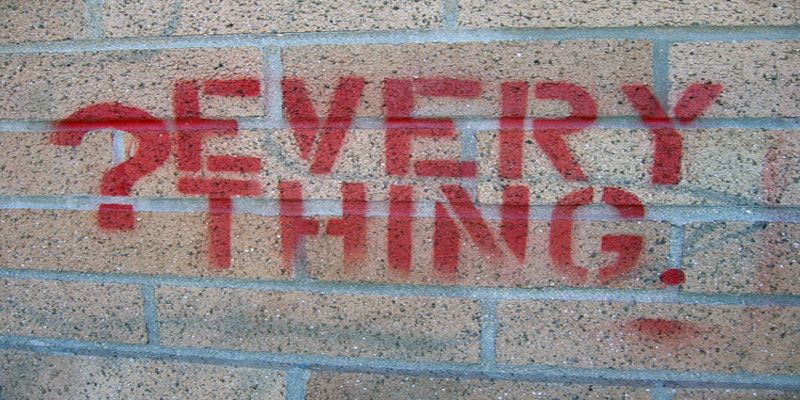Table of Contents
ToggleWe live in a time and age where the world is filled with lies and deceit. Perhaps more so, is the fact that it has never been easier to get misinformation out there to every corner of the world.
To waddle and see through the lies, we especially need one important aspect, skepticism.
It’s also this skepticism that allows us to keep a steady head and eliminate the negative effects of groupthink.
But what exactly does skepticism mean, and how does it protect us against groupthink? Let’s find out.
Skepticism as an antidote to groupthink

We can start using skepticism as a tool to combat groupthink.
A lot of the possible negative effects of groupthink happen unconsciously or because we don’t apply the necessary individual skepticism and critical thinking skills to counteract the less optimal consequences of groupthink like agreeing with the group for the sake of harmony, even though the decision made is wrong or suboptimal when we think about it.
A healthy amount of skepticism allows us to lift the veil from our eyes. It allows us to see things more clearly. To question the validity of the things we see and the things we hear.
Every individual is different. And thus, each of us has their ideas and thoughts about the stuff happening in life. This can sometimes conflict with the group’s desire for cohesiveness and harmony.
Yet, it’s vital to think critically and skeptically about basically everything to keep the group, and you as an individual, on the right path. To keep the group and yourself from turning south and becoming malevolent. To prevent you from making bad decisions.
Frequently Asked Questions (FAQ)
What is skepticism?
Skepticism can be defined as having a questioning attitude and a healthy amount of doubt/suspicion towards instances of knowledge or things happening in life in general.
We can describe skepticism as an attitude that can be applied to any topic in life such as religion, politics, and pseudoscience.
What does groupthink mean?

Groupthink can be defined as a psychological phenomenon that happens within a group of people when the desire for harmony and conformity of the group is more important than each individual’s thoughts, ideas, and goals. This results in a dysfunctional, often irrational decision-making outcome.
The cohesiveness of the group is typically considered more essential than the thoughts, ideas, and goals of each individual in a group.
This particular tendency for all group members to agree at all costs and, thus, minimize conflict among the group members can cause a group to reach a consensus decision without personal critical evaluation.
This can be particularly dangerous if a group turns malevolent.
How do I recognize skeptical people?

Skeptical people can often be recognized for their uncanny unwillingness to take things at face value. They think deeply, hard and for prolonged periods about the things they see and think to know.
Just because an authority figure says something doesn’t mean that skeptical people will automatically accept said words as being truthful or even right. They will examine the subject rationally, independently, and thoughtfully, regardless of whoever is giving them the information.
They yearn to know the ins and outs of the information and subjects they’re perceiving. Aiming to understand the topic at hand as well and holistic as possible.
How to learn skeptical thinking

Skepticism and critical thinking skills are both vital to reach the truth.
Learning skeptical thinking, or becoming a more skeptical thinker, is possible for everyone. However, it should always be kept in mind that some people will naturally be more skeptical and adept at it than their peers because of their base personality.
The first step is to stop taking everything at face value.
People, media, and organizations can all have multiple reasons for telling something or giving information. Their intentions might not always be pure, and so, it might be possible that they are intentionally, but also unintentionally giving the wrong information. Just because someone gives incorrect information does not mean they are being malevolent or doing it on purpose, of course.
The second step is to become an independent thinker.

This means regardless of who tells you something, no matter how much you like said person, always subject the new (and old) information to a thorough and independent examination. You will have, or learn to have, trust in your own intelligence and personal judgment. Learn to dissect the topic at hand independently and try to look at it from different points of view. From all possible angles, so to speak.
The third vital step is not being biased.
People often hear what they want to hear.
No matter what is being told, no matter how you feel about it, you should always throw away your preconceived biases about subjects. Personal feelings should be kept away as far as possible from the truth. An objective base should be established as the foundation which the truth rests upon.
A healthy amount of skepticism should be applied at all times and towards every subject. Some people make the mistake of letting their biases get the better of them and thus, as a consequence, take information from people or organizations they trust at face value. And while the information of those we trust might regularly be truthful, they are still at risk of making mistakes or even possibly deliberately giving false information.
Is skepticism good or bad?

In my opinion, skepticism is good and even necessary for possessing good judgment and, thus, making good decisions.
People often have multiple motivations going on at the same time for giving the correct, or possibly incorrect information. Those motivations might range from being pure and truthful to being unpure and untruthful in an attempt to manipulate you for their personal goal.
Without skepticism, we are at the mercy of other people’s goodwill. And while there are certainly people of good will out there, there are also plenty of people willing to misuse, or even abuse you to get what they want. For their gain.
Skepticism and critical thinking skills allow us to combat against malevolent people and organizations. They enable us to protect ourselves and to make good decisions by utilizing good judgment.
Conclusion

Skepticism and critical thinking are both necessary skills to make good decisions that might, quite literally, save your life. Don’t be a sheep and follow the herd if you don’t want to fall victim to group thinking behavior.
Ultimately, you need to use your judgments to make the best decisions with the information that is given to you. Our parents or significant others can’t do this for us forever. No matter how tempting not having to take responsibility might be at times.
These are both skills that can be learned and consequently applied by everyone.

